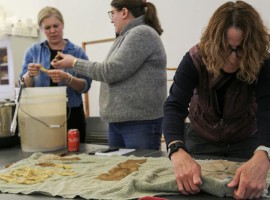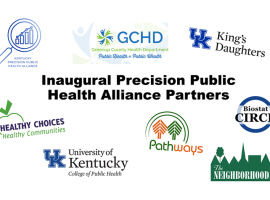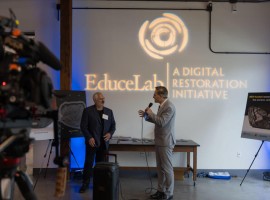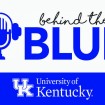'Behind the Blue': Public Health Leader Helps Kentuckians Find Help Now
One of the biggest barriers to accessing treatment for substance use disorders can be the time it takes to find an open space in a treatment facility. By the time a clinician, family member or patient can find the right facility for their needs and navigate the insurance process, the bed in question may have been filled or the window of opportunity for recovery may have passed.
During a visit with her own primary care physician, Terry Bunn, an associate professor in the University of Kentucky College of Public Health and director of the Kentucky Injury Prevention and Research Center (KIPRC) heard that same sentiment repeated. As the leader of KIPRC, a bona fide agent of the Kentucky Department for Public Health, Bunn knew there was a solution to this issue, that more people with substance use disorders could be helped and lives could be saved.
In February 2018, "Find Help Now KY" was launched. Kentucky is currently the only state with a near real-time treatment opening locator for substance use disorders. The locator guides individuals to available treatment openings. It takes into consideration the substance(s) being used, payment options including commercial and public insurance programs, gender identity, preference for in- or out-patient treatment and needed co-occurring treatments such as mental health care, plus 30 more criteria. The site provides daily availability information for treatment openings, to enable rapid admission to addiction programs.
On this week's episode of "Behind the Blue" hear about the development of "Find Help Now KY", the success the site has experienced and KIPRC's efforts to assist other states in the development of their own website to help those in active addiction.
Become a subscriber to receive new episodes of “Behind the Blue” each week. UK’s latest medical breakthroughs, research, artists and writers will be featured, along with the most important news impacting the university.
For questions or comments about this or any other episode of "Behind the Blue," email BehindTheBlue@uky.edu or tweet your question with #BehindTheBlue.
[UK Fight Song]
['Behind the Blue' intro music]
From the campus of the University of Kentucky, you're listening to 'Behind the Blue'.
[intro music]
Kiser: One of the biggest barriers to accessing treatment for substance use disorders can be the time it takes to find an open space in a treatment facility. By the time a clinician, family member, or patient can find the right facility for their needs, and navigate if their insurance is taken, the bed in question may have been filled, or the window of opportunity for recovery may have passed. During a visit with her own primary care physician, Terry Bunn, an associate professor in the University of Kentucky College of Public Health and Director of the Kentucky Injury Prevention and Research Center, or KIPRC, heard that same sentiment repeated. As the leader of KIPRC, a bonafide agent of the Kentucky Department for Public Health, Bunn knew there was a solution to this issue. That more people with substance use disorders could be helped, and lives could be saved. In February 2018, Find Help Now Kentucky was launched. Kentucky is currently the only state with a near real-time treatment opening locator for substance use disorders. The locator guides individuals to available treatment openings. It takes into considering the substances being used, payment options, including commercial and public insurance programs, gender identity, preference for in- or out-patient treatment, and needed co-occurring treatments, such as mental health care, plus 30 more criteria. The site provides daily availability information for treatment openings to enable rapid admission to addiction programs.
I'm Kody Kiser with UK PR and Marketing, and I'm joined by my colleague Olivia Ramirez. On this week's episode of 'Behind the Blue', we talk to Bunn about the development of Find Help Now Kentucky, the success the site has experienced, and KIPRC's efforts to assist other states in the development of their own website to help those in active addiction.
[music]
Kiser: Dr. Terry Bunn is our guest today on 'Behind the Blue.' And Dr. Bunn, correct me if I'm wrong on this, but you are the Director of the Kentucky Injury Prevention and Research Center at - which is part of the UK College of Public Health. Is that correct?
Bunn: That's correct.
Kiser: Oh, excellent. We're already off to a good start. I didn't mess that up. Also known as KIPRC - [kip-rick] okay.
Bunn: Yes.
Kiser: That's good. KIPRC. Alright. Good. So, thank you for joining us today. The first thing we always ask of everyone that comes on the podcast is, how did you come to join us here at the University of Kentucky.
Bunn: Well, I started at the University of Kentucky, actually in the Kentucky Injury Prevention and Research Center. I was hired by the former director at KIPRC because my Ph.D. is actually in Immunotoxicology, and looking at environmental exposures and their affects on human populations. So, it was a - an excellent fit at the time, with looking at occupational exposure. So, I directed and managed the Occupational Safety and Health Surveillance Program for a number of years before I became director.
Kiser: Now, where are you from originally and where did you - your undergrad and graduate and doctoral work, where did that all take place?
Bunn: Well, originally, I'm from upstate New York, and I completed my undergraduate degree and graduate degree at Cornell University.
Kiser: So, Kentucky - do you have Kentucky ties, Kentucky roots at all, or you just ended up here? Has it been a culture shock to be here a little? You know -
Bunn: My husband works for a local company, and he was transferred here. So that's what originally brought us to Kentucky, and.. Yeah, no. Everyone's been, since the day we arrived, very inviting and we loved the Southern culture. So...
Kiser: Horse racing and hot browns, and...
Bunn: Yes, exactly.
Kiser: Well, I wanted to ask you - I want to talk a little bit about your work with KIPRC. Overall, what does the Research Center focus on?
Bunn: Okay. Well, we focus on both community practice - and when I say community practice, that means we are implementing a number of programs where we're actually out in the local community, such as installing smoke alarms. We work with - installing child passenger safety seats. So we do a number of community initiatives, and they are - a lot of our community practice is as the bonafide agent for the State Department for Public Health. So, that is a very unique aspect of KIPRC in general. We are unique, pretty much in the nation, in that we are the collaboration between the University of Kentucky and the Kentucky State Department for Public Health. So, we can really focus on the use of our community practice and interventions that will inform our research studies, and then in tern, can be used back to improve and to enhance the community interventions that we have and to establish new ones as well.
Kiser: I think that's an important point to make when - or maybe it's just me - but I think maybe, when people think about the - on a state level like the Department of Public Health - I think a lot of times people think infectious disease. They think of vaccinations, or they think, you know, outbreaks of hepatitis, or something like that. I don't know that it's often that people think about it in terms of injury prevention. And, that time of thing. Like you were saying, smoke detectors and child safety seats. That seems really complex too, because those types of things, it seems- the regulations on those types of things change frequently, and it would be a lot on your plate to kind of keep up with it and keep the public informed on it.
Bunn: Well, yes. When you're talking about injury prevention, it's such a broad area. You know, it covers the prevention of motor vehicle crashes, prevention of fires, prevention of drug overdoses. So, yes, we do try to, you know - We work with the CDC regularly on a number of our different project, and we're always looking and updating our literature reviews on what is, you know, the new evidence and newly informed programs and equipment- and everything that's on the market that we can utilize that will be the latest, state of the art, or the latest that has the most evidence behind it.
Kiser: One of the things I wanted to ask about has been most recently - kind of done some new release here, is regarding the work on a website that the center has developed. Which is called Find Help Now Kentucky, which is findhelpnowky.org. Which is a site that is designed to deliver real-time information about available space in substance use disorder treatment programs. And also guide users to the right type of treatment for their needs. Is that correct?
Bunn: Well, we - we provide the information to the website user on - Alright, so typically, there are a number of different agencies throughout the state, throughout the US in general, that have lists of substance use disorder treatment facilities. What makes us unique in our site, is we are the only one, I believe, that has actually worked with and had personal meetings with all of the substance use disorder treatment facilities in the state to gain their participation and update their availability on a daily basis. So, we not only provide that list, but it is a list with the available openings at that time, within the last 24 hours. So, they're updated daily. And we make it very easy for the facilities to update their availability on the back end of the website. We make it as easy for them as possible.
Kiser: One of the things I was thinking about with that was, it mentions the right type of treatment for their needs. Why is that such as specific thing? What do you mean by the right type of treatment?
Bunn: Okay, so, when I say that, we're- we're not guiding people or suggesting to anyone the type of treatment that they need. What our website offers is based on what they desire themselves. You know, someone may say, well, I have children so I cannot enter an inpatient facility. I really, really need to have outpatient treatment. So we make sure - or we made sure when we developed that website that we not only had residential treatment, but then we also have outpatient. We have some medication-assisted treatment providers. So some of those facilities are able to provide the treatment needed based on individual preferences.
Ramirez: So, how did the idea for Find Help Now Kentucky develop? And can you talk a little bit about who you worked with to get the site up and running?
Bunn: Yeah. It actually came from a number of different stakeholders, including my own primary care physician, when I talked to him in a visit and asked him, when a patient is identified with a substance use disorder, what is the biggest gap they find in being able to get them to substance use disorder treatment. And he said, well frankly, the longest time is the time that my nurse has to spend finding a facility that has an opening and that will accept their type of insurance.
He said we've had instances where we think we have the facility, we contact the patient, and then once we make the arrangements, it turns out that opening is no longer available. Or they actually - the insurance may be a little bit different, so they don't really accept that type of insurance. So, he told me that that was the biggest gap. And we heard that from a number of stakeholders, including our Director for the Office of Drug Control Policy, too, for Kentucky. He also had those same concerns. And it was a suggestion from him as well, that this was a real need in the state to have a treatment locator.
And some of the partners that we worked with in developing this, of course, since we received this funding by the CDC as the bonafide agent for the State Department for Public Health, they were integral in providing input to the development of the website, as well as the Office of Drug Control Policy. We had, actually, facility stakeholders who also provided input. Because we did not to develop a website where facilities were not going to be able to use and really want to input their information on the back end of it. And, in promoting the website and marketing the website, actually the Office of Governor Bevin was integral also in promoting the website too.
Ramirez: So, when did the launch and do you have any numbers on how often it's been used?
Bunn: Yeah. The site was launched in February with Governor Bevin with the Secretary for the Justice and Public Safety Cabinet, Secretary John Tilley. With our Director of the Office of Drug Control Policy, Mr. Van Ingram, and our Commissioner for the Department of Public Health, Dr. Jeffery Howard. And since our launch in February 2018, as of last week, we had 530 facilities, which represents 88 percent of all treatment facilities in the state, participating in the website. And to date, we've had over 55,000 visits on the site, and with over 38,000 unique searches. So, I think it's been quite well received, and I think the numbers are increasing weekly. So, you know... we're very, very happy with how well the website's been received to date.
Kiser: How does this change the options, and therefor the outlook, for people in Kentucky communities who may have otherwise had a difficult time, not only finding treatment, but getting into a place in a timely fashion? How does this change that?
Bunn: Well, it helps in that the search is very, very easy to conduct. You only - you don't need to actually enter anything for the address for which you are looking, or the city or town for treatment, and the list that comes up will start out with those facilities that are closest to the area that you input to the system. For instance, if you just type Lexington, Ky, it will start with those facilities that are nearest to where your search was initiated. And then, provide those facilities by distance going from nearest to furthest away. On the other hand, if you would like to conduct a search for a facility in Kentucky, but you would rather have a facility that's far away from you, but still in Kentucky, you can actually switch that search criteria so that the search will start with those facilities furthest away from you in Kentucky.
We make it very easy so that if you also want to search by the type of insurance that you have, then that will also provide with that list that only accepts that type of insurance, whether you're on Medicaid or if you have private insurance, military insurance. So, there are a lot of criteria that you can search on to really target down the list you receive with openings based on the type of treatment and the type of insurance that you have.
Kiser: That's got to be huge for people who, like you were saying, have so many problems some times getting to a place and their insurance doesn't quite cover, or doesn't cover at all, the treatment that facility might provide, or a particular facility. I'm assuming it helps the facilities as well, because it helps match more people up with with them, and in an effort for them to be able to, I guess, be able to show positive results, because look at the people we've been able to help. Because of that increased connectivity, it helps them keep their numbers up in some cases.
Bunn: Yeah. We're really hoping that it will be - that it is beneficial to them and it enhances the workflow, so they're not spending a lot of time on the phone with individuals who may not have they - who may have the type of insurance that they don't accept. So, the - hopefully the calls are more targeted to those facilities that have the insurance that the individuals are covered by.
Ramirez: So, in June, you wrote an opt-ed for the Courier Journal talking about your personal experience with having a family member with a substance use disorder. Can you tell us a little bit about that, and maybe like what you learned from that experience and maybe how that impacted your thoughts and feeling on addiction?
Bunn: Yes. This was a family member, actually former brother-in-law who - he started out slowly. First contributing to trouble on the job, and eventually with him losing his job. And then he and my sister and their family moving in with my parents, and after a time, stealing medications from my step-mother, stealing items out of the house that my dad would just find missing. And eventually, it led to him being jailed for actually impersonating a law enforcement officer try to obtain drugs out of medicine cabinets from homes that he had entered as a law enforcement officer. So, he went to jail and he and my sister are divorced now. He does not have any relationship with my nephews. And in this case, it's kind of sad because he actually, I do not believe, has received the treatment that he has needed. So it's become very important to me to do this.
Kiser: Definitely a lot of families in Kentucky who have experienced, or are experiencing, a very similar situation. And I think we all - anybody listening to this - probably knows someone who has been affected in some way. Whether it's in their own family or some type of environment; work environment or personal environment. It's definitely a challenge for communities to figure out how to face and address a lot of this and get people the help that they need.
Bunn: Yes, I think it's very critical, and I really hope that this site does provide the information on the treatment facilities with available openings when the individual is ready to seek treatment. Because that window of opportunity may be very small, and hopefully this website fills that need for when they are ready.
Kiser: What's some feedback that you've gotten so far, as far as the website, as far as the efforts that have been put in there? Both from health care professionals in some of these treatment facilities, but also from - I mean, have you received - what's the results that you've seen from some of this?
Bunn: We are hearing, you know - because we've only started since February, but we are starting to hear stories of individuals, yes healthcare providers who are using it, and actually a lot of agencies are starting to use it as well now. Some agencies that we had not expected to be using it, and we just hear stories that people are, now that they've become familiar with the website, they're really, really using it as a critical resource that they have to offer individuals for when they are ready to seek treatment.
Kiser: How does your office go about general promotion of the site? What are some tools that have been used to kind of promote the actual site and use of it?
Bunn: Yeah, we are working with a promotional company actually to promote the website. So, we have a number of ads, we've had tv spots, radio spots, billboards, digital ads. So, we're trying to promote it as heavily as we can throughout the state. We're also attending professional conferences so healthcare providers are aware of it, even law enforcement, social workers, librarians, to really make it available and known to the local community as a resource to use.
Kiser: And I know that this affects families in a very hard and devastating way sometimes. Even what you were alluding to with your nephews. There was a promotional effort that used youth as well.
Bunn: Yes. We had also had a high school challenge. In which we worked with the office of the - with the Governor's office on and a number of other stakeholders, including WLKY out of Louisville. And what it was, was a challenge that was offered to every high school in Kentucky, where they could develop a promotional campaign for the website and for Don't Let Them Die. So, we had about 83 letters of intent, and about 30 actual ad campaigns that were submitted throughout the state. So we judged them, and we're actually using some of those student ad campaign materials in some of our digital ads right now, actually. So, it's been hopefully good at raising awareness in the high schools about not only substance use but also the availability of findhelpnowky.org as a resource even for those that are in high school or for their families. You know, just to increase general awareness.
Kiser: So the website, again I want to reiterate that to everyone is findhelpnowky.org for people. And I know too, that at the time we're recording this, this is right in the middle of the holiday season, and I know that that, you know, can be a difficult time, sometimes, for depression and substance abuse issues, and can be difficult for families. And so it is timely that we're having the conversation, and continuing the conversation about this. I know that, you know, we kicked this off in February and we're still continuing the conversation about it.
Is there anything that - is there anything that we didn't ask or touch on that you feel like may be important to mention, or anything you wanted to talk about that we didn't touch on?
Bunn: Well, I guess that you did touch on it. You know, about this time of year, and also mental health issues. I did forget to mention that with findhelpnowky.org, that we also do have search fields where you can also search if you need treatment for co-existing disorders, such as mental health disorders, or eating disorders, or any other type of treatment for, you know, HIV, Hepatitis C. Then that is also a criterion that you can search on and come up with those facilities - a list of those facilities that will be able to offer that co-existing treatment - or that co-treatment.
Kiser: Dr. Terry Bunn. Thank you so very much for being with us. We really appreciate it. It's definitely a serious issues, it's definitely that, you know, a lot of people are struggling to find help and find it in the right locations. This sounds like definitely something that is designed to do just that; to help people be very specific about trying to get the help that they need, and make things a lot easier. Just through a lot of problems that people might have. So thank you very much for your work in that regard.
Bunn: Well thank you for inviting me here.
Kiser: I do want to say, one last time before we finish up, the website is Find Help Now Kentucky, and the website is findhelpnowky.org.
['Behind the Blue' theme music]
Thank you for joining us on this edition of 'Behind the Blue.' For more information about this episode, or any other episode, visit us online at uky.edu/behindtheblue. You can send questions or comments via email to behindtheblue@uky.edu, or tweet your questions using #behindtheblue. 'Behind the Blue' is a joint production of University of Kentucky Public Relations and Marketing, and UK Healthcare.
[music]





